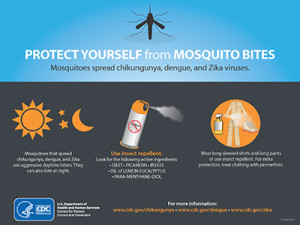
Employers receiving news about the spread of the Zika virus may be considering the risk for their employees and potential claims filed by individuals who contract the disease. According to the Centers for Disease Control and Prevention (CDC), the Zika virus is transmitted to people primarily through the bite of an infected Aedes aegypti species mosquito. These are the same mosquitoes that spread dengue and chikungunya viruses. Mosquitos become infected when they feed on a person already infected with the virus. Infected mosquitoes spread the virus to other people through bites. It was more recently found that Zika can be sexually transmitted. The virus can also be spread through blood transfusion.
Where are outbreaks occurring?
Prior to 2015, Zika virus outbreaks occurred in areas of Africa, Southeast Asia and the Pacific Islands. In May 2015, the Pan American Health Organization (PAHO) issued an alert regarding the first confirmed Zika virus infections in Brazil. Today, outbreaks are occurring in many countries. The virus will continue to spread. It is difficult to determine how and where the virus will spread over time. However, researchers who tracked dengue fever outbreaks in the past predict small local outbreaks of Zika virus in Florida and Texas.
No mosquito-transmitted cases have been reported in the continental United States, but cases have been reported in returning travelers. Locally transmitted Zika virus has been reported in the Commonwealth of Puerto Rico.
What are the symptoms?
About 1 in 5 people infected with Zika virus become ill. Symptoms include fever, rash, joint pain, conjunctivitis (red eyes), muscle pain and headache. The incubation period (the time from exposure to symptoms) for Zika virus disease is not known for sure, but is likely to be a few days to a week. The illness is usually mild with symptoms lasting for several days to a week. Zika virus usually remains in the blood of an infected person for a few days but it can be found longer in some people. Severe disease requiring hospitalization is uncommon. Deaths are rare. Cases are identified by the symptoms, confirmation of recent travel to locales with confirmed infections and blood test results.
How is Zika treated?
No vaccine or medications are available to prevent or treat Zika infections. An infected individual showing symptoms should get plenty of rest, drink fluids to prevent dehydration and take medicine such as acetaminophen to relieve fever and pain. Aspirin and other non-steroidal anti-inflammatory drugs (NSAIDS), like ibuprofen and naproxen, should not be taken until dengue can be ruled out to reduce the risk of hemorrhage (bleeding). An individual taking medicine for another medical condition should consult his or her healthcare provider before taking additional medication.
What special precautions should be taken by pregnant women?
A mother already infected with Zika virus near the time of delivery can pass the virus to her newborn around the time of birth, but it is rare. It is possible that the virus could be passed from mother to fetus during pregnancy. This mode of transmission is being investigated and is not yet understood. To date, there are no reports of infants getting Zika virus through breastfeeding.
There have been reports in Brazil of microcephaly and other poor pregnancy outcomes in babies of mothers who were infected with Zika virus while pregnant. Microcephaly is a medical condition in which the circumference of the head is smaller than normal because the brain has not developed properly or has stopped growing. Additional studies are needed to further characterize this relationship. More studies are planned to learn more about the risks of Zika virus infection during pregnancy.
The CDC recommends that women who are pregnant or women trying to become pregnant use special precautions including avoiding travel to impacted areas and using protective clothing and insect repellent. Women trying to become pregnant or who are thinking about becoming pregnant should consult with their healthcare provider before traveling to these areas and strictly follow steps to prevent mosquito bites during the trip.
What should employers do?
Businesses with employees traveling to areas of infection should follow the precautions outlined by the CDC, including preventative measures to avoid mosquito bites. If a workers’ compensation claim is filed for Zika virus exposure, it should be handled as any disease or exposure claim would be handled. A thorough investigation of the claim and circumstances involved should be conducted and medical tests and evaluation should be done to confirm a diagnosis. Compensability determination would follow applicable regulatory standards for determining whether or not exposure occurred within the course and scope of employment.
Click here for additional information posted by the CDC on Zika virus.
Dr. Teresa Bartlett, SVP, Medical Quality